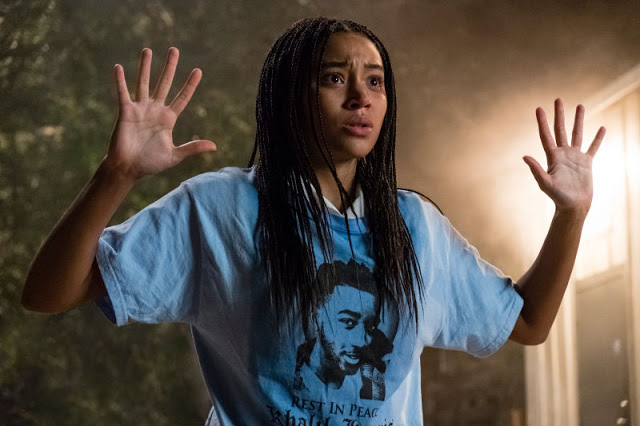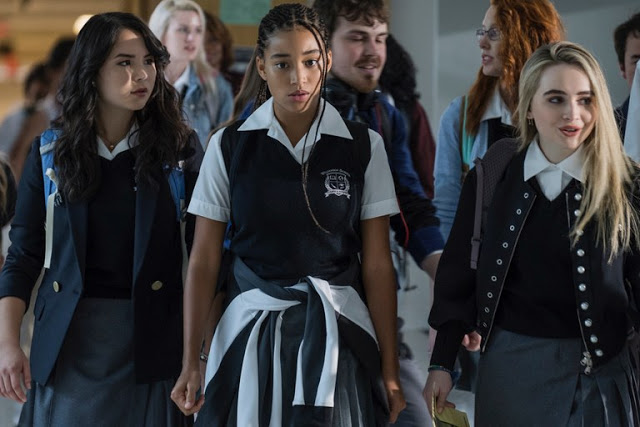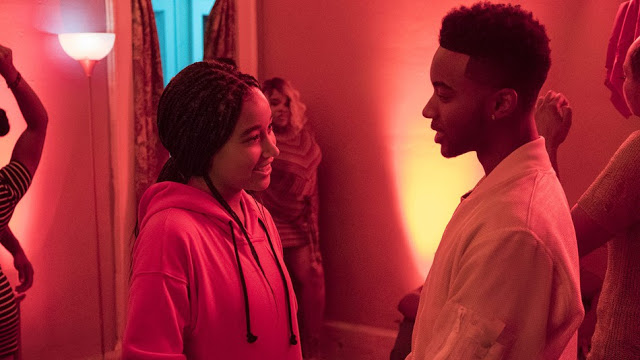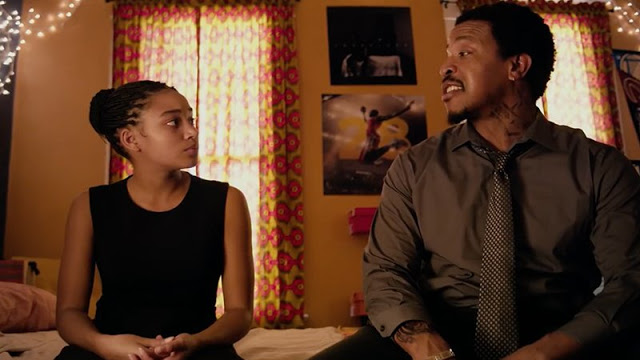Overstuffed yet bracing, predictable yet provocative, The Hate U Give is above all defiantly, unapologetically loud. Yet it opens with a scene of sober, ominous quiet. As the camera glides through the fictional Compton-esque neighborhood of Garden Heights, it locks on a two-story house and creeps through an open window, where a man, Maverick, is talking with his wife and three children at the kitchen table. It could be any chat where a parent imparts advice about the larger world—about sex, politics, family values—but here, Maverick (Russell Hornsby) is calmly but forcefully telling his kids how to behave if they ever when they inevitably get pulled over by the police. Keep your hands flat on the dashboard, he says. Be respectful. Don’t make any sudden movements; don’t give them any reason to hurt you. The burden, he patiently explains to his kids, isn’t on the cops; it’s on them. His children, all under the age of 10, listen intently, as though their father is teaching them about the difference between life and death. Which, of course, he is.
In making The Hate U Give, the director George Tillman Jr. faces an unusual and somewhat perverse challenge. Tasked with adapting Angie Thomas’ bestselling novel to the screen, he must dramatize a fictional story—about the fallout of a white police officer killing an unarmed black youth—in an era where such events are horribly, commonly real. In a country already familiar with the tragic deaths of actual people—many of whom the film name-checks, including Eric Garner, Alton Sterling, and Philando Castile—do we really need an entertaining yarn about invented characters suffering the same fate?
Maybe we do. Movies, of course, can do more than provide an escape; they can shine a light and hold up a mirror. The Hate U Give suffers from its share of problems: a graceless voiceover, an overheated subplot, a general lack of faith in its audience. But it more than justifies its existence thanks to the way it converts its blistering ideas—its politics, its fury, its hope—into a coherent piece of pop art. It may be polemical, but it’s also personal.
The person at its center is Starr (Amandla Stenberg, stunning), Maverick’s daughter who, years after absorbing that kitchen-table wisdom from her father, is now a thriving high school sophomore. The Hate U Give is vague about Starr’s financial situation—Maverick, an ex-con, runs a local convenience store, while his wife, Lisa (Regina Hall), works as a nurse—but they’re well enough off to avoid sending Starr to Garden Heights’ disreputable public school, instead shipping her across town to Williamson Prep. It may just be a coincidence that Starr’s luxurious private academy shares the same initials as “White People”, but she’s plainly a minority, and she intuits the need to calibrate her behavior accordingly.
Which means that, among other things, The Hate U Give continues 2018’s robust cinematic tradition of black characters consciously masking their race. Of course, Starr’s metamorphosis isn’t as dramatic as Lakeith Stanfield speaking in David Cross’ voice in Sorry to Bother You, or John David Washington sending Adam Driver as his white stand-in in BlacKkKlansman. Her shift into “Starr Version 2” is more modest and internal; as soon as she arrives at Williamson, she stuffs her hoodie into her backpack, she refrains from speaking in slang, and she generally refuses to call any attention whatsoever to her own blackness.
How do you know all this? Because she tells you! The screenplay for The Hate U Give, by Audrey Wells (who died just before the film opened), is powerful and purposeful, but it underlines its themes with irritating directness. Starr’s voiceover, where she constantly explains who people are and what they do, seems to have been ripped from a “show, don’t tell” warning class in film school, while several characters make grandiose speeches about How We Live Now. The movie has a lot to say—about police brutality, about socioeconomic discrimination, about latent bigotry—but its insistence on obviousness and repetition can blunt the impact of its message.
But only to a point. Despite its occasional clunkiness, The Hate U Give develops considerable momentum as it plunges toward an abyss of fear, confusion, and rage. Its catalyzing incident occurs early, when Starr gets a ride home from a party from a childhood friend, Khalil (Algee Smith, seen last year in yet another tale of blue-on-black violence in Detroit), who gets pulled over for allegedly failing to signal. Khalil is a sweet kid with a blinding smile, but he never received Maverick’s cautionary training. And so, one second he’s reaching for his hairbrush; the next, he’s heading to the morgue.
This is obviously inflammatory material, and The Hate U Give isn’t shy about setting its kindling ablaze. Tillman, whose last feature was the ill-received Nicholas Sparks weepie The Longest Ride, isn’t an especially accomplished stage-setter—a scene at a basketball practice is almost comically unpersuasive—but he has a strong command of pacing and tone, and he shrewdly shuns the fallacy of #BothSides, instead delivering a film that is gratifyingly subjective. Starr’s journey, which progresses from naïf to witness to activist, is really an awakening, a process of both finding the strength of her voice and grappling with the fact of her very identity. At the same time, the movie makes room for a spectrum of perspectives, challenging Starr’s assumptions and realizations without veering into stilted, social-science sermonizing.
Some of these didactic episodes are more successful than others. It makes sense to explore Starr’s relationships with her white friends at Williamson Prep (“Someone watched Straight Outta Compton again last night”), but when one of them (Sabrina Carpenter) essentially proves to be a poster child for All Lives Matter—dismissing Khalil as a drug-dealer destined for an early grave, sympathizing with the shooting officer’s “poor family”, happily participating in protests just as an excuse to skip class—it plays less like a recognition of the existence of naiveté and intolerance than like lazy writing. Yet the movie smartly characterizes Starr’s white boyfriend, Chris (KJ Apa), as neither a glowering racist nor a woke advocate, just a clueless boob. (This means that Apa, the face and abs of most of Riverdale’s dumbest moments, is weirdly well-cast.) When Chris insists, “I don’t see color,” it’s as cringeworthy a line as you’ll find in a Ricky Gervais comedy, but Starr’s response—“If you don’t see my blackness, you don’t see me”—illustrates her dawning awareness of her place in America as a young black woman. And a conversation between Starr and her badge-wearing uncle (Common), about how cops react in heated situations, bristles with nuance and insight as well as anger.
The Hate U Give, whose title derives from a Tupac Shakur song (in case you’re as dense as I am: it’s an acronym for “thug”), is such an authentic and explosive portrait of American race relations, it’s unfortunate that Tillman felt the need to shoehorn in a melodramatic subplot, in which a local crime lord (Anthony Mackie, overqualified for such a one-dimensional role), puts Starr in his crosshairs after she testifies about Garden Heights’ underworld elements to a grand jury. The film is already so fiery, it hardly needed a scene where characters literally get trapped in a burning building.
But again, these aren’t subtle times. And even if The Hate U Give stumbles on occasion, its lead actress never falters. Stenberg, whom you may remember as the precious Rue in The Hunger Games, delivers an extraordinarily assured and complex performance, evoking Starr’s despair and anxiety as well as her passion and intelligence; a late scene where her voice catches in her throat before she speaks is somehow both agonizing and heartwarming. Some of her best scenes come opposite Hornsby, who gives Maverick a gritty edge and pride without descending into the stereotype of the brutish black male.
I’m hesitant to tell you that you have to see The Hate U Give, because it’s a decidedly imperfect movie. But you know what? You should go see it anyway. It’s engrossing, it’s topical, and it’s powerful. And in an era dominated by black bodies appearing lifeless in front of the camera—whether on news broadcasts or cell phone footage—we should do whatever we can to support them behind it, especially when they tell stories with such urgency and vitality. That means patronizing their art. At some point, the burden shifts to us.
Jeremy Beck is the editor-in-chief of MovieManifesto. He watches more movies and television than he probably should.




